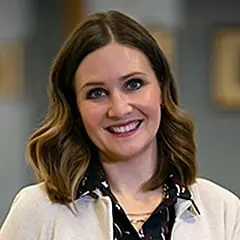 | 1.5 LU |
 | 1.5 LU |
In response to overwhelming evidence that a high school diploma no longer signifies graduate preparedness for achieving economic success in the real world, the Ewing Marion Kauffman Foundation set out on the largest high school improvement project in the U.S. – currently centered in the greater Kansas City metro. This effort, The Real World Learning (RWL) Initiative, is driven by education, business, civic, and community leaders who aim to provide the experiences that students need to succeed in the real world. The regional goal is for 100% of the 85,000 students currently in Real World Learning schools to graduate with at least one “Market Value Asset” experience that they can use in their postsecondary career. 5 years after launching the Real World Learning initiative, Kauffman Foundation and partner architect, Multistudio, evaluate what has worked, where there have been challenges, and what hairy problems lie ahead. This session will share insights into how schools think differently about education through the Real World Learning lens and what that means for their space needs. Any school, district, or region considering their own moves to promote learning connected to the real world will leave this session with a clearer picture for how to support educators in successfully navigating this shift.
Learning Objectives:

Anna is a program leader for Real World Learning (RWL) in Education for the Ewing Marion Kauffman Foundation, where she develops and delivers programming that enables employers to effectively and efficiently engage with students to deliver quality RWL experiences. She is especially passionate about the power of work-based learning as a transformative engagement for both youth and employer culture.

Michael leads research for Multistudio, specializing in measuring outcomes in applied settings. He connects research to practice with experience teaching in both K-12 and higher education. He studies the interactions between learning and place to support efforts to create more inclusive spaces, with recent papers on women in active learning and inclusive engagement strategies. He also co-authored the 2nd Edition K-12 Deck of Spaces and hosts the education podcast Two Pint PLC.

A highly regarded project designer and client engagement leader with 20 years of experience, Kelly focuses his efforts on inclusive design and student preparedness for the 21st century workforce. Leaning heavily on research-based processes, his leadership provides a common language around universal design to increase design effectiveness, improve learning outcomes, and lead stakeholders toward solutions that address their unique challenges. Kelly’s work has earned numerous national awards for design excellence, innovation, and inclusive design.
This track elevates Research on learning and learning environments and focuses on methodology, findings, and implications for practice. Tangible takeaways are encouraged, including tools and resources that support innovation and improvements to learning environments. There is Art in how we utilize Science to improve our design outcomes and our design and research process. To this end, dissemination of research findings is a priority so that learning environments are re-imagined and enhanced based on evidence and measured impact, not based on trends.
Primary Core Competency
Educational Visioning: Exhibits an understanding of best and next practices related to educational leadership, programming, teaching, learning, planning and facility design. Establishes credibility with educators, community members and design professionals while conceiving and leading a community-based visioning process. Demonstrates the ability to articulate the impact of learning environments on teaching and learning and uses that ability to facilitate a dialogue that uncovers the unique needs and long-range goals of an educational institution and its stakeholders – translating that into an actionable written/graphic program of requirements for the design practitioner.